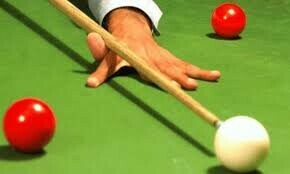
DOHA: Pakistani cueist Mohammad Asif cemented his legacy in the sport, capturing his third IBSF World Snooker Championship title with a thrilling 5-3 triumph over Iranian Ali Gharahgozlou on Wednesday.
Asif — who gained entry into the championship through a wild card spot courtesy of the Pakistan Billiards and Snooker Association (PBSA) — joins an elite group as he equalled India’s Pankaj Advani‘s record of three titles. He also became the country’s most successful cueist with five international titles.
Asif’s path to glory began with a strong start in the best-of-nine frame final, taking the first frame 70-25 with a solid break of 40. However, Gharahgozlou countered with a break of 84 to claim the second frame 87-7.
Asif, who defeated Cyprus’ Michel Geogriou 5-3 in the semi-final late on Tuesday, regained momentum in the third frame, crafting a 56-break to win 82-8.
The 42-year-old Asif then sealed the fourth frame 106-8 with a sublime century break (106) — his sixth in the event — moving 3-1 ahead.
The Pakistani veteran extended his lead to 4-1 with a convincing 82-12 win in the fifth frame.
Gharahgozlou refused to surrender, taking the sixth frame 91-43. Asif’s miss on red was brutally punished by the Iranian as he recorded a break of 58 to halve the deficit.
In the seventh frame, Gharahgozlou produced a stunning 118-break to reduce the difference to 4-3.
However, Asif — who won the championship in 2012 and 2019 — drew upon his vast experience to close out the match.
In the decisive eighth frame, Asif seized an early opportunity and showcased his mastery. With precise and masterful potting, he constructed a brilliant break of 93, anchored by eight blues and four blacks.
A minor foul on the yellow proved inconsequential, as the championship was already secured after a three-hour match.
Overcome with relief and pride, Asif beamed with a triumphant smile as he waved his hand towards the audience.
In a video message, he thanked his family, friends and federation who helped him throughout his journey.
Asif’s path to the final was tumultuous. Initially failing to qualify in Stage-I, he rebounded by defeating compatriot Asjad Iqbal.
Asif then edged through the group stage and knockout rounds, showing resilience against defending champion Ali Alobaidli and Ahmed Saif, before dominating Mohamed Shehab and outlasting Geogriou.
Joint bronze medals were awarded to Mahmoud El Hareedy of Egypt and Geogriou. El Hareedy made history as Africa’s first medallist. Geogriou also claimed the highest break prize with a 136-point break.
Published in Dawn, November 7th, 2024












































